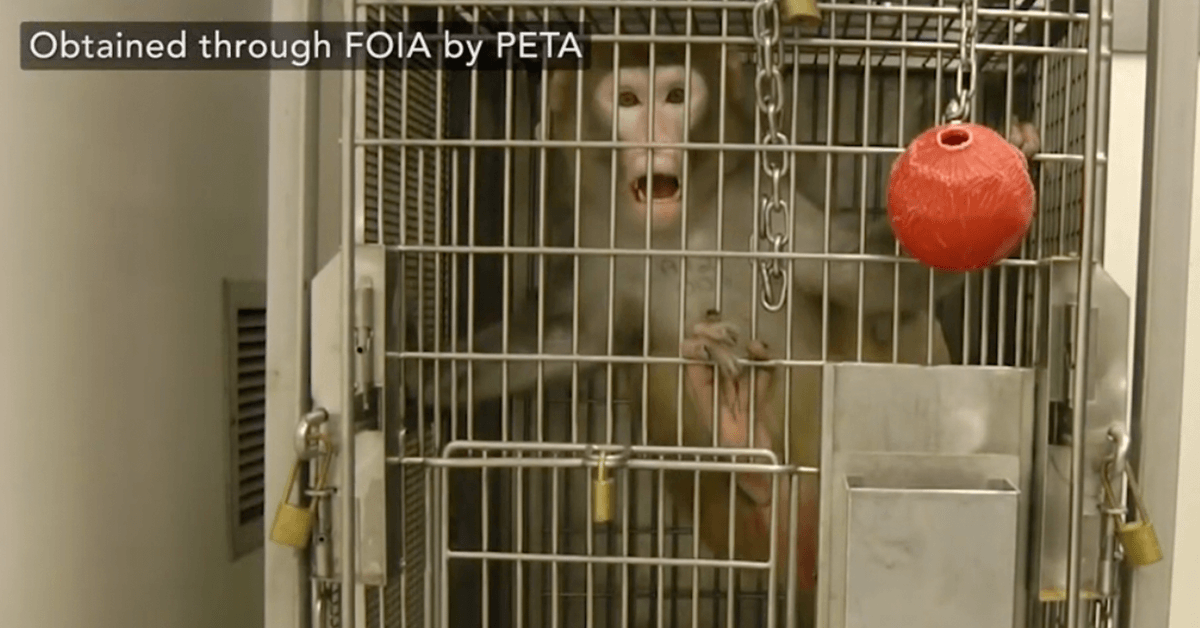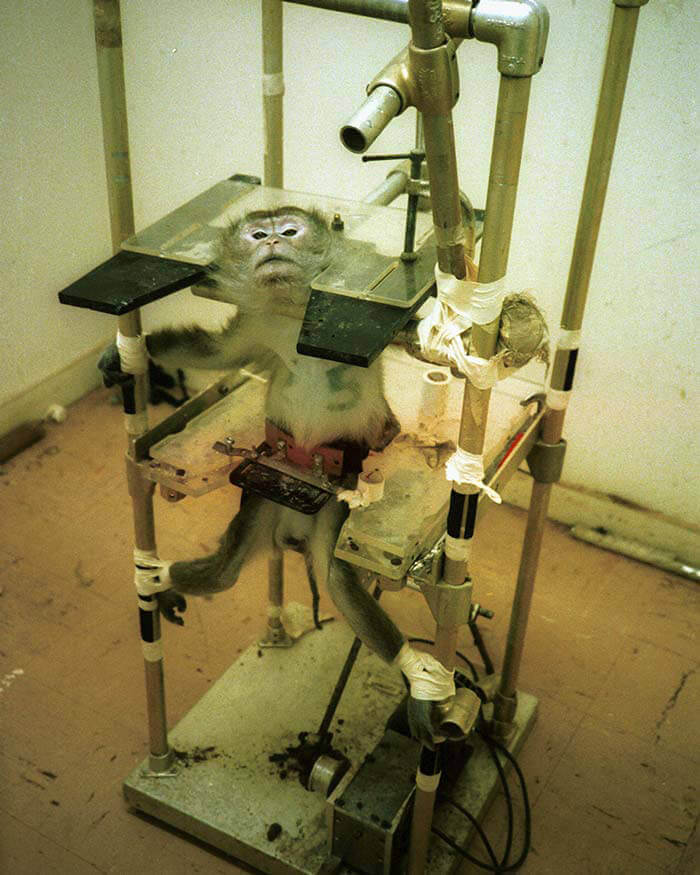3 Ways PETA Entities Combat Speciesism and Advocate for Primates
A Look Inside Our Worldwide Efforts to Help Monkeys
As uncovered by PETA and reported in The Arizona Republic, the Washington National Primate Research Center and its monkey-breeding facility in Mesa, Arizona, have violated health and veterinary regulations, operated without state oversight, failed to prevent the introduction and spread of deadly diseases among monkeys, and been repeatedly cited for multiple violations of animal welfare laws—all while breeding monkeys next to a toxic waste site.
What this breeding facility is doing isn’t just pointless, dangerous, and cruel—it’s also a terrible waste of lives and important research dollars. Plus, even after monkeys leave this compound and its toxic tap, they still face a lifetime of terror while being used for experiments elsewhere.
But this case is just one example of the systemic speciesism and oppression that countless primates face daily.
Right now, thousands of them are languishing in cages, living in fear, and being denied the opportunity to engage in natural behavior vital to their physical and mental well-being. These complex animals are used in crude, cruel, and useless experiments; they’re forced—out of fear—to “grin” on command on the sets of Hollywood movies and television shows; some are captured in their natural habitats and torn away from their families; and others are even forced into cruel manual labor.
It’s pure speciesism—the misguided belief that one species is more important than another—that causes humans to inflict such suffering on other individuals. This supremacist worldview has deadly consequences for countless primates every year. That’s why PETA campaigns hard to wake people up and show them the suffering that our fellow primates endure when they’re exploited for cheap entertainment, used in painful experiments, or abused by humans in any other way.
3 Big Ways PETA U.S. and PETA Entities Help Monkeys
1. PETA Asia Undercover Investigation Reveals Monkeys Chained and Abused for Coconut Milk
Many kind people choose coconut milk instead of cow’s milk because they don’t want to support cruelty to animals. But a disturbing PETA Asia investigation reveals that terrified young monkeys in Thailand are kept chained, abusively trained, and forced to climb trees to pick coconuts that are used to make coconut milk, meat, flour, oil, and other products.
Before PETA Asia’s groundbreaking investigation made headlines around the globe, this type of cruelty was a dirty industry secret. But following the worldwide release of PETA Asia’s damning footage, more than 26,000 stores committed to no longer purchasing one egregious brand’s products and the majority will no longer buy any coconut products derived from monkey labor.
2. PETA Exposes Horrific Experiments on Monkeys
Every year in the U.S., tens of thousands of primates are imprisoned inside laboratories, where most of them are abused and killed in invasive, painful, and terrifying experiments. While it’s well known that monkeys are sensitive and intelligent, experimenters treat them as if they were disposable pieces of laboratory equipment.
In labs, these animals have barely enough room to sit, stand, lie down, or turn around. The rich environment full of sensory stimulation that they should be experiencing is replaced by one devoid of color, scent, and almost every other type of enrichment.
The majority of primates who are used in laboratories exhibit abnormal behavior patterns that are caused by physical abuse, psychological stress, social isolation, and confinement to barren enclosures. Many go insane, rocking back and forth, pacing endlessly in the cages, and doing repetitive motions such as back-flipping. They even engage in acts of self-mutilation, including tearing out their own hair and biting their own flesh. Experiments on captive animals suffering from extreme stress can never teach us anything meaningful about naturally occurring illnesses in humans, and experimenters know it.
PETA is working hard to push our government leaders and the scientific community forward, away from a deadly reliance on archaic experiments on animals. You can join our call.
3. Monkeys Aren’t Actors or Clowns Here to Entertain Humans
In stark contrast to the lives they’d have in nature, primates used for entertainment are denied adequate psychological and social stimulation and proper exercise. Their instincts—which include exploring, choosing mates, raising young, and foraging—are completely thwarted. As a result, they often develop neurotic behavior patterns, such as pacing, rocking, swaying, cage-biting, and self-mutilation.
Intelligent, curious, highly social animals have needs that can’t be met on the sets of films or television shows, at training compounds, in traveling circus-style shows, or at seedy roadside zoos. Most primates used for entertainment are taken away from their mothers prematurely—a cruel practice that denies the infants the maternal care and nurturing that they need for normal development. In order to force young primates to perform on cue, physical and psychological abuse are commonly used.
However, this dire information doesn’t always make it to spectators. The use of animals for entertainment fools the public into believing that they’re happy in human environments. But with the many advancements that have been made in computer-generated and holographic imagery, there’s no reason to use real monkeys or other animals in film, television, or any other type of show.
PETA has been both diligent and successful in our efforts to get primates and other animals out of the entertainment industry. In fact, all the top 10 ad agencies in the U.S. banned the use of great apes in their commercials after learning about this important issue from us. You can do your part by never buying a ticket to any venue where animals are exploited for a cheap and fleeting gimmick.
Take Action to Help Monkeys — PETA Makes It Easy!
Using your phone or computer, you can support our campaigns to help animals no matter where you are. It only takes a minute to complete multiple PETA action alerts that will put pressure on abusers and make a real difference for animals.



